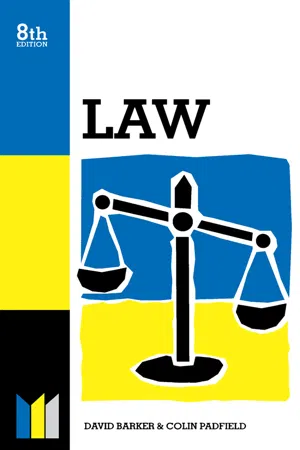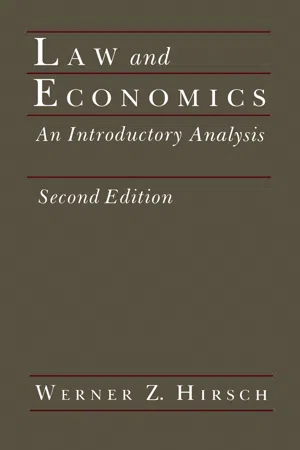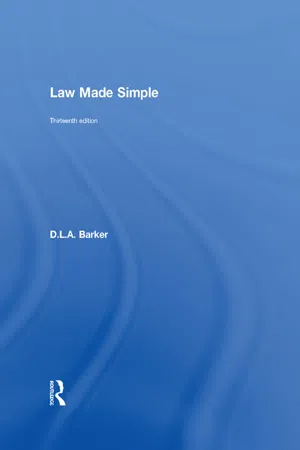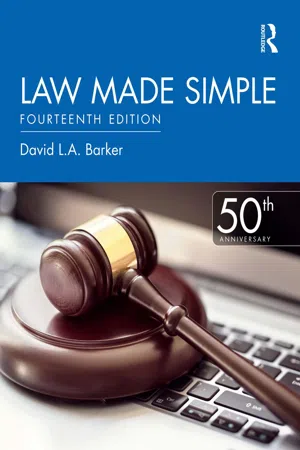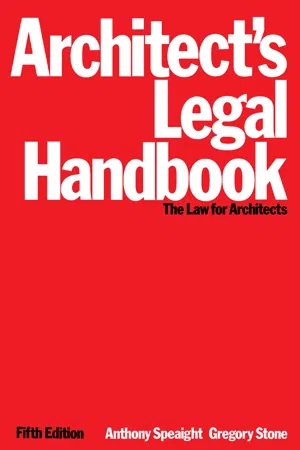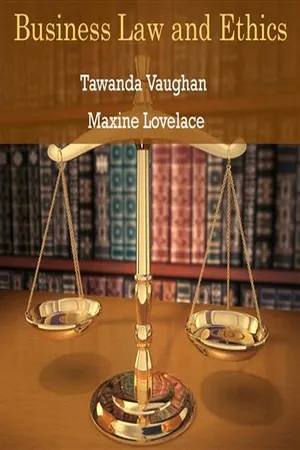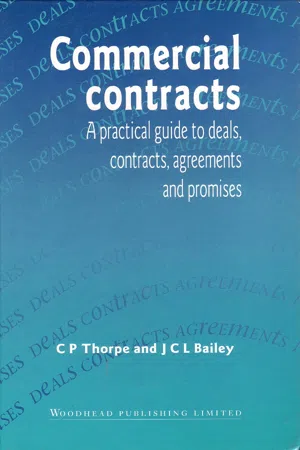Law
Contract Law
Contract law governs the formation and enforcement of agreements between parties. It encompasses the rules and regulations that dictate how contracts are created, what makes them legally binding, and the remedies available if one party breaches the contract. This area of law is essential for ensuring the smooth functioning of business transactions and personal agreements.
Written by Perlego with AI-assistance
Related key terms
1 of 5
12 Key excerpts on "Contract Law"
- eBook - PDF
Law
Made Simple
- D. L. A. Barker, C. F. Padfield(Authors)
- 2014(Publication Date)
- Made Simple(Publisher)
7 THE LAW OF CONTRACT In his book Principles of the Law of Contracts, Sir William Anson defined a contract as a legally binding agreement made between two or more parties, by which rights are acquired by one or more to acts or forebearances on the part of the other or others. Shortly it may be defined as an agreement between two or more parties which is intended to have legal consequences. The agreement referred to in the definition means a meeting of minds, called in law consensus ad idem, signifying that the parties are agreed together about the same thing. The definition also emphasizes that the parties to the contract must intend that their agreement shall be legally enforceable. Unless the law regognizes this and enforces the agreements of parties, it would be impossible to carry on commercial or business life. For this reason the law of contract plays a leading role in courses on business studies. These contractual agreements give rise to rights and obligations which the law recognizes and enforces. But certain agreements, such as domestic and social arrangements, are not intended by the parties to be legally binding. The law allows for this. Thus, if Cumming and Gowing agree to meet for dinner and Gowing fails to turn up, the law will do nothing in the matter. The agreement was not intended to create legal rights and duties, and, as such, it is not a contract in law. Every contract is an agreement, but not every agreement is a contract. The object of the law of contract is to identify those agreements which it will enforce and those which it will not. This is of prime importance and will be referred to later in more detail. 1. Essentials of a Valid Contract An agreement will be enforced when the following essential elements exist: (a) Offer and Acceptance. There must be an offer by one party and an acceptance of it by the other. (b) Intention to create legal relations. (c) Capacity of the parties. Each party must have the legal capacity to make the contract. - eBook - PDF
Law and Economics
An Introductory Analysis
- Werner Z. Hirsch(Author)
- 2014(Publication Date)
- Academic Press(Publisher)
5 Contract Law INTRODUCTION Contract Law has developed over the centuries as a means of facilitating economic exchanges. By providing guidelines for transactions other than those involving real property, it helps increase the wealth of the nation. To facilitate the assessment of Contract Law, its basic legal premises are first presented. After the nature of a contract is defined and related to the notion of consideration, a number of formation defenses are ex-plored. Thereafter, performance defenses, the notion of anticipatory repudiation, and damages rules are explored. After setting forth the legal principles of Contract Law, I examine some of its economic aspects. The economic framework used allows the posi-tions of the buyer and the seller in general, within credit transactions in particular, to be evaluated. The focus is on transaction costs in the for-mation and performance stages, and on evaluation of different contract clauses. The unconscionability of certain contract clauses and contract terms are also examined within this framework. THE BASIC LEGAL PREMISES OF Contract Law WHAT IS A CONTRACT? A contract is a promissory agreement for a future exchange, freely and voluntarily arrived at. The law of contracts is designed to facilitate the 129 130 5 Contract Law process of exchange and to minimize breakdowns, and thus it contrib-utes to transaction efficiencies. Within a system of contract remedies, incentives are provided to make good on promises. If the parties to the bargain agree, the law terms the agreement a contract, and for certain types of agreements society provides legal enforcement remedies should one of the parties decide to breach the contract. Contracts as a societal institution facilitate efficient exchange by providing a social mechanism for enforcing those agreements where aggregate value between the par-ties can be presumed to have increased. But not all promissory ex-changes in society are enforceable as contracts. - eBook - PDF
- Douglas Wood, Paul Chynoweth, Julie Adshead, Jim Mason(Authors)
- 2021(Publication Date)
- Wiley-Blackwell(Publisher)
2 The Law of Contract 2.1 General principles The law of contract is frequently the fi rst ‘ case law ’ subject to which students are introduced when they commence their legal studies. The main reason for this is that contracts affect the general public more than most areas of law and arise daily in business and commercial life. The contract is the most important stage in the process when land or buildings are transferred and when building projects are undertaken. The ‘ golden age ’ of the law of contract was in the nineteenth century when its major principles were evolved on free market ideologies. Many of the cases referred to in this chapter date from this ground breaking period. The case illustrations used are not limited to this period, however, and the case law referred to in this chapter ranges from the very old to the very modern. A contract is a legally binding agreement. It is a bargain and each side, or party to the contract, must contribute something to it for it to be valid. Not every agreement is a contract nor is it intended to be so. The legally binding element must be present before a valid contract can emerge. In other words the parties must be able to demonstrate their intention to adhere to the agreement made. The protection afforded by entering into a contract is that if it is broken by one party to it, the other party must be able to take the contract-breaker to court if desired. A distinction is made between the situation where the parties exchange mutual promises, known as a bilateral contract, and a unilateral contract where one party promises to do something in return for the other party carrying out some task. When the task is completed the promise made in a unilateral contract becomes enforceable. 2.2 Formalities A contract may be made in any form that the parties wish. This is the case regardless of the sums involved or the complexity of the agreement. - eBook - ePub
- David Barker(Author)
- 2014(Publication Date)
- Routledge(Publisher)
Chapter 7The law of contract
Key points
• what constitutes a contract• the essentials of a valid contract• void, voidable and illegal contract• the ways in which a contract may be discharged• remedies for breach of contractIn his book Principles of the Law of Contracts , Sir William Anson defined a contract as a legally binding agreement made between two or more parties, by which rights are acquired by one or more to acts or forbearances on the part of the other or others . Shortly it may be defined as an agreement between two or more parties that is intended to have legally enforceable consequences.The agreement referred to in the definition means a meeting of minds, called in law consensus ad idem , signifying that the parties are agreed together about the same thing. The definition also emphasizes that the parties to the contract must intend that their agreement shall be legally enforceable. Unless the law recognizes this and enforces the agreements of parties, it would be impossible to carry on commercial or business life. For this reason the law of contract plays a leading role in courses on business studies.These contractual agreements give rise to rights and obligations that the law recognizes and enforces. But certain agreements, such as domestic and social arrangements, are not intended by the parties to be legally binding. The law allows for this. Suppose, if Cumming and Gowing agree to meet for dinner and Gowing fails to turn up, the law will do nothing in the matter. The agreement was not intended to create legal rights and duties, and, as such, it is not a contract in law. Every contract is an agreement, but not every agreement is a contract.The object of the law of contract is to identify those agreements that it will enforce and those that it will not. This is of prime importance and will be referred to later in more detail. - Available until 13 Jul |Learn more
- David L.A. Barker, David L. A. Barker(Authors)
- 2020(Publication Date)
- Routledge(Publisher)
Chapter 7The law of contract
Key points
- what constitutes a contract
- the essentials of a valid contract
- void, voidable and illegal contract
- the ways in which a contract may be discharged
- remedies for breach of contract
In his book Principles of the Law of Contracts , Sir William Anson defined a contract as a legally binding agreement made between two or more parties, by which rights are acquired by one or more to acts or forbearances on the part of the other or others . Shortly it may be defined as an agreement between two or more parties that is intended to have legally enforceable consequences.The agreement referred to in the definition means a meeting of minds, called in law consensus ad idem , signifying that the parties are agreed together about the same thing. The definition also emphasizes that the parties to the contract must intend that their agreement shall be legally enforceable. Unless the law recognizes this and enforces the agreements of parties, it would be impossible to carry on commercial or business life. For this reason the law of contract plays a leading role in courses on business studies.These contractual agreements give rise to rights and obligations that the law recognizes and enforces. But certain agreements, such as domestic and social arrangements, are not intended by the parties to be legally binding. The law allows for this. Suppose, if Cumming and Gowing agree to meet for dinner and Gowing fails to turn up, the law will do nothing in the matter. The agreement was not intended to create legal rights and duties, and, as such, it is not a contract in law. Every contract is an agreement, but not every agreement is a contract.The object of the law of contract is to identify those agreements that it will enforce and those that it will not. This is of prime importance and will be referred to later in more detail.An agreement will be enforced when the following essential elements exist:7.1 Essentials of a valid contract
- Offer and acceptance
- eBook - PDF
Architect's Legal Handbook
The Law for Architects
- Anthony Speaight, Gregory Stone(Authors)
- 2014(Publication Date)
- Butterworth-Heinemann(Publisher)
The English Law of Contract NICHOLAS VINEALL 1 Introduction 1.01 The purpose of this chapter is to give an overview of the law of contract: to show both how it relates to other areas of the law, and to describe the general principles on which the English law of contract operates. Although most of the examples are from areas with which architects will be familiar, the principles they illustrate are for the most part general. Other sections of this book deal in detail with specific areas of the law of contract and their own special rules. The general rules described in this chapter may on occasion seem trite and hardly worth stating. Yet it is often with the most fundamental - and apparently simple -principles of law that the most difficult problems arise, and without understanding the framework of Contract Law, detailed knowledge of any particular standard form contract is of little use. This chapter condenses into a few pages material which if fully discussed would fill many long books. The treatment is necessarily selective and condensed. 2 Scope of the law of contract 2.01 The criminal law sets out limitations on people's behaviour, and punishes them when they do not conform to those rules. A criminal legal action is between the State (the Crown) and an individual. The civil law is quite different. It determines the liabilities which exist between parties in particular circumstances. The sanctions of the civil law are not (save in most unusual circumstances) punishments, but rather remedies - the law tries to put things 'back to rights'. 2.02 Two of the biggest areas of the civil law are contract and tort. In certain factual contexts they can overlap, and in recent years their overlap has caused the courts great problems, but they are conceptually quite distinct, and it is important to understand the distinction. 2.03 A plaintiff will sue a defendant in contract or tort when he objects to something the defendant has done or failed to do. - eBook - PDF
Agreements
A Philosophical and Legal Study
- Oliver Black(Author)
- 2012(Publication Date)
- Cambridge University Press(Publisher)
PART II Law 215 7 Contract 7.1 Elements of Contract Law There are various ways of defining a contract in English law, 1 but a standard definition is ‘an agreement giving rise to obligations which are enforced or recognised by law’. 2 A similar approach is taken in other legal families; 3 for example, Article 1101 of the French Civil Code provides that a contract ‘is an agreement by which one or several persons bind themselves [s’obligent], to one or several others, to transfer, to do or not to do something’. 4 An agreement, without more, is not a contract: requirements in English law are that the parties intend to create legal relations, that any relevant formalities are fulfilled and, usually, that consideration is provided. 5 The first two requirements are considered in section 7.21; the third is a pecu- liarity of common-law systems. 6 Both the definition and the function of 1 Atiyah (1986b), 16 rejects the idea that there is a single model of a contract; see also the strictures in Atiyah (1986j) on the attempt in Fried (1981) to reduce contract to a single principle. For a similar view of contract in Roman law, see Nicholas (1962), 159 ff.; n. 39 below. Atiyah (1986c), 11 f. and Atiyah (1986l), 5 f. present and criticise a ‘classical model’ of contract. Atiyah (1986i), 63 suggests that in some cases a contract is better characterised as a joint act than as an agreement or an exchange of promises; Atiyah derives that claim from Holmes (2005). See further n. 10 below. On the relation between agreement and joint action, see section 8.5222 below. 2 Peel (2007), para. 1–001. 3 On the concept of a legal family, see Zweigert and K¨ otz (1998), 63 ff. 4 On the concept of contract as agreement in French law, see K¨ otz (1997), 3 (citing Pothier’s definition, which combines talk of agreement with talk of promises); Nicholas (1992), 61; von Mehren (1992), para. 6. On that concept in German law, see Markesinis et al. - eBook - PDF
- Richard Mann, Barry Roberts(Authors)
- 2019(Publication Date)
- Cengage Learning EMEA(Publisher)
These transactions continue to be governed by general Contract Law. Figure 9-1 sum- marizes the types of law governing contracts. See Fox v. Mountain West Electric, Inc., later in this chapter. DEVELOPMENT OF THE LAW OF CONTRACTS [9-1] Contract Law, like the law as a whole, is not static. It has undergone—and is still undergoing—enormous changes. In the nineteenth century, almost total freedom in form- ing contracts was the rule. However, contract formation also involved many technicalities, and the courts imposed contract liability only when the parties complied strictly with the required formalities. During the twentieth century, many of the formalities of contract formation were relaxed, and as a result, con- tractual obligations usually are recognized whenever the parties clearly intend to be bound. In addition, an increas- ing number of promises are now enforced in certain cir- cumstances, even though such promises do not comply strictly with the basic requirements of a contract. In brief, the twentieth century left its mark on Contract Law by limiting the absolute freedom of contract and, at the same time, by relaxing the requirements of contract formation. Accordingly, we can say that it is considerably easier now both to get into a contract and to get out of one. Common Law [9-1a] Contracts are primarily governed by state common law. As we mentioned in Chapter 1, the Restatements, pre- pared by the American Law Institute (ALI), present many important areas of the common law, including contracts. Although the Restatements are not law in themselves, they are highly persuasive in the courts. An orderly pre- sentation of the common law of contracts is found in the Restatements of the Law of Contracts, valuable authori- tative reference works extensively relied on and quoted in reported judicial opinions. - No longer available |Learn more
- (Author)
- 2014(Publication Date)
- College Publishing House(Publisher)
____________________ WORLD TECHNOLOGIES ____________________ Chapter- 5 Contract A contract is a legally enforceable agreement between two or more parties with mutual obligations. The remedy at law for breach of contract is damages or monetary compensation. In equity, the remedy can be specific performance of the contract or an injunction. Both remedies award the damaged party the benefit of the bargain or expectation damages, which are greater than mere reliance damages, as in promissory estoppel. Origin and Scope Contract Law is based on the principle expressed in the Latin phrase pacta sunt servanda, which is usually translated agreements to be kept but more literally means pacts must be kept. Contract Law can be classified, as is habitual in civil law systems, as part of a general law of obligations, along with tort, unjust enrichment, and restitution. As a means of economic ordering, contract relies on the notion of consensual exchange and has been extensively discussed in broader economic, sociological, and anth-ropological terms. In American English, the term extends beyond the legal meaning to encompass a broader category of agreements. This article mainly concerns the common law. Such jurisdictions usually retain a high degree of freedom of contract, with parties largely at liberty to set their own terms. This is in contrast to the civil law, which typically applies certain overarching principles to disputes arising out of contract, as in the French Civil Code. However, contract is a form of economic ordering common throughout the world, and different rules apply in jurisdictions applying civil law (derived from Roman law principles), Islamic law, socialist legal systems, and customary or local law. ____________________ WORLD TECHNOLOGIES ____________________ Elements At common law, the elements of a contract are mutual assent and consideration. - eBook - PDF
Commercial Contracts
A Practical Guide to Deals, Contracts, Agreements and Promises
- Chris Thorpe, John Bailey(Authors)
- 1996(Publication Date)
- Woodhead Publishing(Publisher)
Entering into a contract Contract Law textbooks usually begin with the principles of offer and acceptance and the requirement of consideration, and we must now consider these two subjects. The practical significance of these topics may not be immediately apparent, so let us begin with a brief explanation. An understanding of the principles of offer and acceptance will enable you, in most but not all situations, to identify the precise moment at which a contract comes into existence. The importance of being able to identify that moment precisely should be apparent, because this is the moment at which both parties are committed to the transaction. Before this moment either party is free to pull out of the transaction, but from this moment neither is free to do so. Consideration is a technical legal requirement for the formation of a valid contract. This requirement is supposedly the most dis-tinctive feature of English Contract Law and is a favourite academic topic, but in practice there are only a few commercial situations in which the requirement of consideration causes problems. But in these situations it is important to recognise that there is a problem, because otherwise the parties may enter into an agreement which is unenforceable. Once we have dealt with these two topics we can (as it were) get 39 Commercial contracts 3.1 Offer and acceptance The law considers that every contract comes into existence as a result of the acceptance of an offer. An offer made by one party is accepted by the other party (or parties), and a contract is formed at the moment of acceptance. In section 3.1.8 we will question whether every contract can be analysed in this way, but we must begin by understanding what these terms mean and by taking a close look at the process by which every contract supposedly comes into existence. 3.1.1 Offer An offer is a proposal which will result in a contract if the person to whom the proposal is made simply accepts it. - John Adamson, Amanda Morrison(Authors)
- 2016(Publication Date)
- Cengage Learning EMEA(Publisher)
Cengage Learning reserves the right to remove additional content at any time if subsequent rights restrictions require it. 6-1 Creation of Offers 113 What Must Be in a Contract? Diaz, 16, contracted to sell his full drum set to his classmate Martin, also 16, for $450. They concluded their contract with a handshake in front of a couple of friends. If one of them later decides he does not want to go through with the deal, can the contract nonetheless be enforced in court against him? Why or why not? Because of its limited resources, the court system is very selective in what it will enforce. Criminal laws and laws allowing recovery for certain private inju-ries (torts) are highest on the list for enforcement as they are necessary for keeping peace in society. However, when it comes to contracts , generally defined as agreements between two or more par-ties that create obligations, the courts are far more selective. Requirements of a Legally Enforceable Contract In particular, there are six major requirements that must be satisfied before courts will treat a transaction as a legally enforceable contract. These are offer and acceptance, genuine assent, legality, consideration, capacity, and proper form. 1. OFFER AND ACCEPTANCE There must be an agreement composed of an offer and an acceptance upon which to base the contract. The person who makes the offer is termed the offeror . The person to whom it is made is the offeree . The terms of the offer must be definite and accepted without change by the party to whom it was intended to be offered. 2. GENUINE ASSENT The agreement must not be based on one party’s deceiving another, on an important mistake, or on the use of unfair pressure exerted to obtain the offer or acceptance. 3. LEGALITY What the parties agree to must be legal. An agreement to commit a crime or tort cannot be a legally enforceable contract.- R. J. Marks, R. J. E. Marks, R. E. Jackson(Authors)
- 2013(Publication Date)
- Pergamon(Publisher)
LEGAL ASPECTS OF CONTRACTS Offer and Acceptance The Offer The basis of contract is agreement. Agreement is composed of an offer and an acceptance. In order to see whether a contract has been made the law looks to see whether one party has made an offer to do or refrain from doing something, and, if so, whether that offer has been accepted by the other party. The test which the law applies is an objective one: it looks at the parties' conduct, not their intentions. If one party makes a firm offer which is unequivocally accepted by the other, neither can afterwards contend that he did not intend to enter into a contract. 1 An offer, however, must be distinguished from a mere attempt to negotiate. The latter is called by lawyers an invitation to treat. An offer, if accepted, becomes a binding contract. An invitation to treat, on the other hand, is something which by its nature is incapable of being accepted or becoming binding without further negotiation. An invitation to tender sent by an employer to a number of contractors is generally an invitation to treat rather than an offer 2 , although it may be that by inserting words to the effect that the lowest tender will be accepted it might be turned into an offer capable of acceptance. It follows that the clause frequently inserted to the effect that the employer does not bind himself to accept the lowest or any tender is probably unnecessary. A document or something said by one of the parties may constitute an offer although the party putting it forward does not use the word offer. Estimates have frequently been these ways by inadvertence. The making of small sub-contracts by letter or by word of mouth is perhaps more common. 19 [ Falck v. Williams [1900] A.C. 176. 2 Moore v. Shawcross [1954] C.L.Y. 342. 20 CIVIL ENGINEERING: CONTRACT PROCEDURE held to be offers which become binding when accepted. 1 Whether or not a civil engineering contractor's tender is an offer depends upon its terms.
Index pages curate the most relevant extracts from our library of academic textbooks. They’ve been created using an in-house natural language model (NLM), each adding context and meaning to key research topics.
